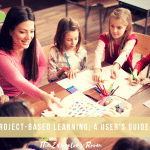I don’t know if I was truly prepared for the technology my new school district was bringing to the table. When I interviewed for my current school system, one of the questions I asked during my interview was, “What resources are available to students and teachers?”
If you’ve ever taught in a Title 1 school, inner-city school, or a school in a small, low-income community, you can understand why that question was one that was of utmost importance.
I’m a Broke Down Teacher (check out that article if you haven’t had a chance.) I’ve adjusted to having little to nothing in my classroom when it came to resources, especially technology. So when the answer came forth from my principal, I was in a state of shock.
You Get a Laptop, and You Get an iPad, and You Get a Laptop!
Every student from 3rd grade on receives their own laptop. Grades 1 and 2 get iPads. They can take it home and bring it back to school. If it breaks down, there’s an IT department gives them a loaner until their laptop is repaired. Every teacher gets a laptop as well. At my school, I also have a projector in the ceiling, which can connect to my laptop through a port on the wall. There’s also a way for it to be interactive, but the training hasn’t happened as of yet.
… and that’s not all.
The district has purchased a reading, math, science, and social studies online programs for students to access, where I can assign students homework, review, or in-class assignments.
My mind was blown away. When I arrived at school with my new laptop, I was so excited. I was trained and exposed to the numerous programs and apps that I could use to further my students’ understanding and expose them to content in a variety of ways.
I was assigning work on Google Classroom. Logging them online to different platforms that could be used as a small group. I was sharing videos. I was assigning extra practice work with the click of a button. When they were done doing one task, I had another one. When social studies started to get overlooked because of time, I found a video, assigned it, and they sat and watched it, silently.
But after an interaction with a parent at my school, I wondered if the technology was becoming more of a cool thing to brag about than about broadening students’ level of exposure and knowledge of content.
Paper or PC?
“It seemed like every piece of homework she had was on the computer last year. Everything she was assigned was digital. Nothing was on paper. I need things to be on paper so that I can show her how to physically work it out.”
Although we try to push for students to show their work and present evidence to support their thinking, it seems that technology makes it optional. We give them exams and tests online and don’t think twice about their scratch paper if there was any, to begin with. The tests aren’t asking them to show their work. There may be an “explain” thrown in every few questions, but having students show their calculations, underline the supporting details, and produce evidence seems to be dying out.
The computer is viewed as more of a fun thing to do, rather than a tool for learning. Majority of our students go home and hop on their video games for the rest of the night, staring at another screen for hours.
Yes, my students have access to the Hubble Telescope, 5-6 online math programs that can explain the concept in 5 different, funny, and interesting ways, but is it just another video that falls into the same “mind space” as their favorite YouTuber? If I take away the computer and give them paper and a problem, could they show me how to solve it, or would they just select a random answer, just like they do online?
Taking a Step Back
I’ve made up my mind that this term, I’m going to take a step back and analyze the real benefit technology is adding to my classroom. Many of the tasks they’re doing, they can do in a small group or as independent practice. Will it take more paper? Maybe. Will it cost more? Hopefully not.
[bctt tweet=”Yes, students receive quicker feedback and given the correct way to solve it if they got it wrong, but are they really paying attention to the corrections and explanations?” username=””]
Yes, students receive quicker feedback and given the correct way to solve it if they got it wrong, but are they really paying attention to the corrections and explanations? Are they learning how to not make those same mistakes again?
Without even thinking, I know the answer is no.
Do you use technology in your classroom? Is it to be a tool that produces growth or a hindrance? Do you limit technology time? Is it earned? Are there areas you know you can improve when it comes to utilizing technology in the classroom?






